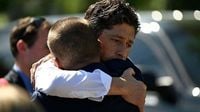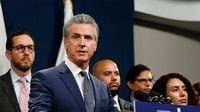The tragic shooting at Annunciation Catholic School in Minnesota on August 28, 2025, has reignited a fierce national debate about the adequacy of the typical response to mass shootings in America. Two young children lost their lives and at least 17 others were wounded when gunfire erupted during what should have been a peaceful start to the school year. As details of the event emerged, so too did the familiar chorus of grief, outrage, and—once again—the call for "thoughts and prayers."
But this time, the ritual response met a wave of frustration from advocates, officials, and faith leaders who say prayer alone is not enough to stem the tide of violence. Minneapolis Mayor Jacob Frey, visibly shaken at a press conference, put it bluntly: "Don’t just say this is about thoughts and prayers right now, these kids were literally praying. It was the first week of school, they were in a church." His words struck a chord with many who feel that the standard expressions of sympathy have become a substitute for concrete action.
Among those amplifying the call for more than prayer was Jen Psaki, former White House press secretary under President Joe Biden and current MSNBC host. In a tweet that quickly went viral, Psaki wrote, "Prayer is not freaking enough. Prayers does not end school shootings. Prayers do not make parents feel safe sending their kids to school. Prayer does not bring these kids back. Enough with the thoughts and prayers." According to The Daily Caller, her remarks drew immediate backlash from conservative commentators and members of the Trump administration, who accused her of disrespecting Americans of faith.
White House Press Secretary Karoline Leavitt responded forcefully during a briefing the next day, calling Psaki’s comments "incredibly insensitive and disrespectful to the tens of millions of Americans of faith across this country who believe in the power of prayer, who believe that prayer works." Vice President J.D. Vance echoed those sentiments, stating on Fox News, "We pray because our hearts are broken. We pray because we know God listens. We pray because we know God works in mysterious ways, and can inspire us to further action."
Psaki, however, refused to back down. On her MSNBC segment "Jen’s Version," she addressed the criticism directly, saying, "But here’s the thing, prayer is a powerful source of comfort for so many people around the world during difficult times, including me. I completely feel that way. And what I said yesterday and will say again now, though, is that prayer alone is not enough to prevent and end the crisis of gun violence in America. It’s not." She continued, "We live in a country where there are more guns than people. There have been five school shootings since the start of the school year on Aug. 1, less than a month ago, and 57 school shootings since January. And the fact that parents like me have to worry every day about whether or not our kids are safe at school is what we should be talking about."
Psaki’s critique was not limited to cultural platitudes. She challenged those in power to move beyond rhetoric and support policies that enjoy broad public support. "People in power—like, say, people in the White House, who are using their platforms to do anything other than call for action for sensible gun safety measures, they're doing anything else, like attacking me, which is a waste of time—they're doing anything but saying what should be done to help prevent tragedies like the shooting in Minneapolis," Psaki declared. She pressed reporters to ask why the administration does not support universal background checks, restrictions on mentally ill individuals purchasing firearms, or bans on assault weapons, noting that "the majority of the country" supports all three.
This tension between faith and action was also the focus of a widely shared opinion piece by Kevin S. Aldridge, a pastor in the African Methodist Episcopal Church. Writing in The Enquirer, Aldridge argued, "Faith without works is dead." He explained, "When we offer prayers without any plan to protect our children, we’re like the neighbor in James 2 who sees a brother or sister in need and simply says, 'Go in peace, be warmed and filled.' That kind of faith is dead. Real faith is living, breathing, moving. It takes shape in acts of love, justice, service, and obedience." Aldridge’s message: prayers must be accompanied by action—lobbying, voting, and confronting lawmakers—if they are to have real meaning in the fight against gun violence.
The divide over how to respond to such tragedies is not just philosophical; it is deeply political. As reported by TNND, Democrats in Congress are preparing to push for new gun control measures as lawmakers return to Capitol Hill, while Republicans remain steadfast in their defense of Second Amendment rights. House Speaker Mike Johnson suggested that the focus should be on mental health and "commonsense solutions" that do not infringe on constitutional rights. "There are a lot of commonsense solutions, things that can be done to protect children at schools and in churches that do not involve taking away the constitutional rights of law-abiding American citizens," Johnson said.
Yet, for many, the urgency of the moment makes the status quo feel intolerable. The statistics Psaki cited—five school shootings in August alone, 57 since January—paint a grim picture of a nation struggling to protect its children. The pressure is mounting for leaders to move beyond words and take decisive action. As the Sisters of Mercy, quoted by Psaki, put it: "Our response can no longer be thoughts and prayers alone." Even Cardinal Leo, as Psaki noted, once retweeted Senator Chris Murphy’s 2017 statement, "Your cowardice to act cannot be whitewashed by thoughts and prayers."
The debate over prayer and policy is not a simple clash between belief and unbelief. As Aldridge and others have pointed out, it is about whether conviction leads to action. The challenge, as the pastor wrote, is for believers to ensure their faith guides their politics, not the other way around. "If we are truly praying to God and listening for God's answer, the path to preventing these tragedies will become clear. And while God may indeed work in mysterious ways, there is nothing mysterious about God's command: Love thy neighbor as thyself."
As the families of Annunciation Catholic School mourn, and as the nation again asks how to make schools safe, the question remains: Will this tragedy finally prompt more than prayers?


